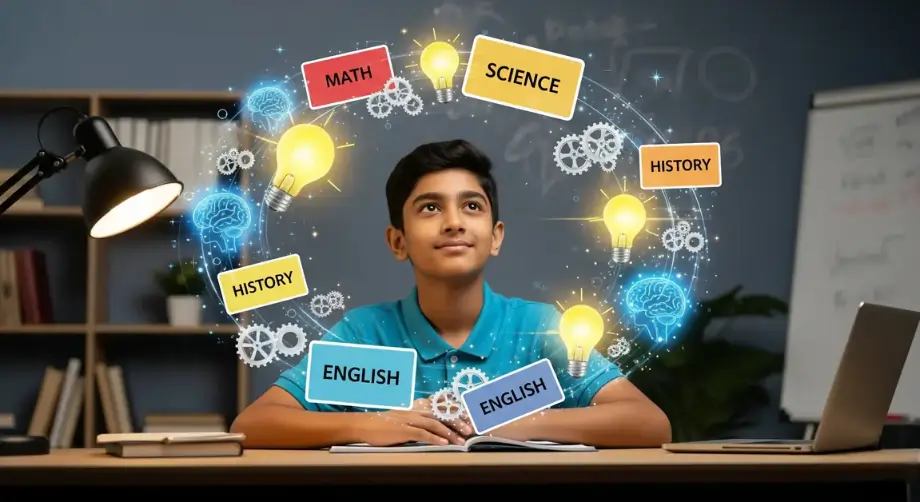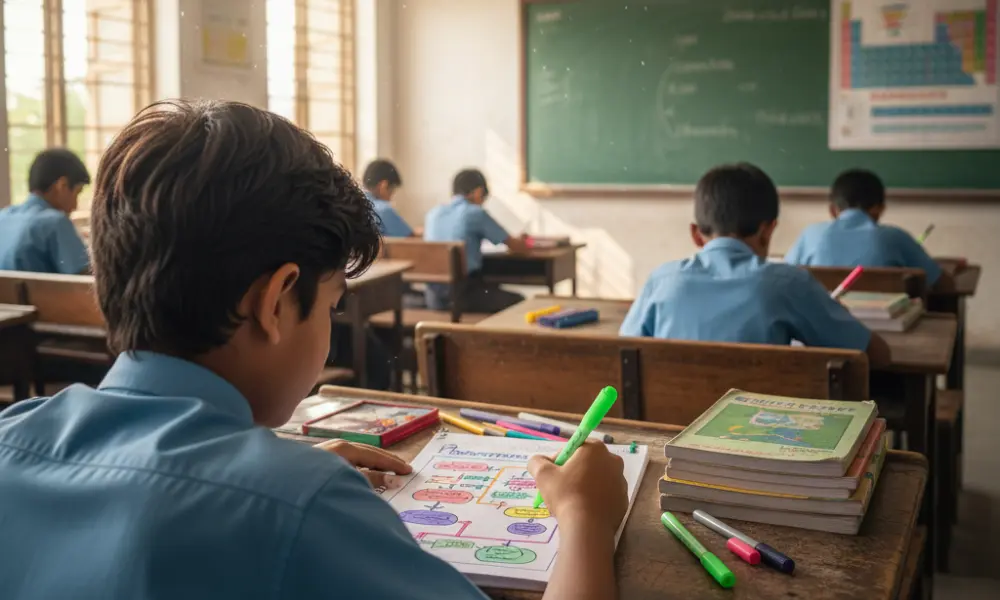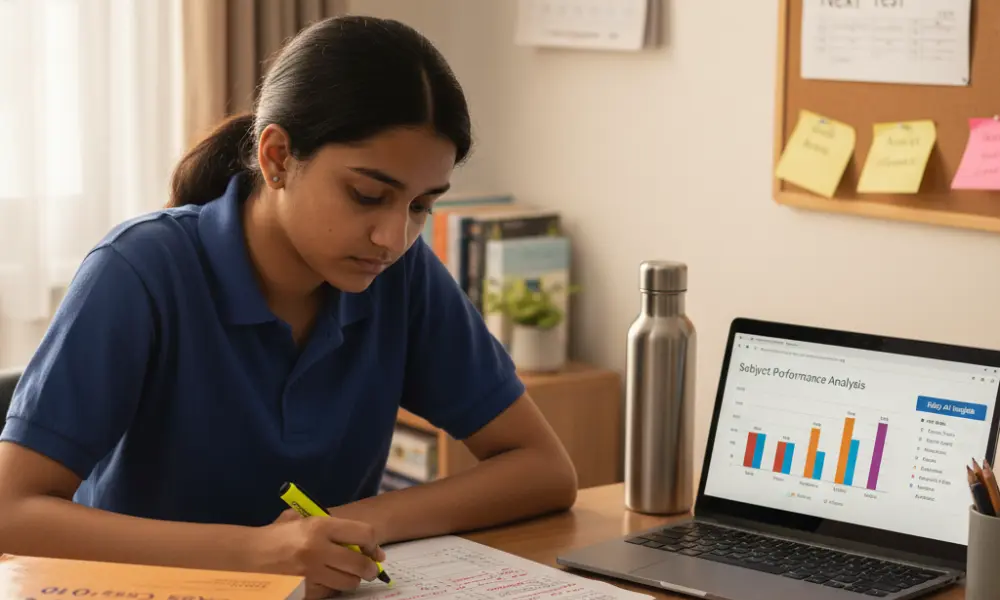Science-backed strategies to help CBSE students master long-term retention across all subjects
Discover proven memory techniques specifically designed for CBSE curriculum success. From spaced repetition to visual mapping, learn practical methods that transform how students retain complex concepts across Mathematics, Science, Social Studies, and Languages for lasting academic achievement.

Memory Techniques That Help CBSE Students Remember Complex Concepts Forever
Picture this: Your child spends hours studying for their CBSE Class 10 Science exam, memorizing the periodic table and chemical reactions. They feel confident walking into the exam hall, but halfway through the paper, those carefully learned formulas seem to vanish from their memory. Sound familiar?
This frustrating scenario plays out in countless Indian households every academic year. The problem isn't that students aren't studying hard enough—it's that they're not using memory techniques that create lasting retention. Research shows that without proper memory strategies, we forget 50% of new information within an hour and 90% within a week.
But here's the good news: memory isn't fixed. With the right techniques, CBSE students can transform their ability to retain complex concepts across all subjects, from intricate mathematical theorems to detailed historical timelines. Let's explore scientifically-proven methods that will revolutionize how your child learns and remembers.
Understanding how memory works is the first step toward improving it. When students learn new information, their brains create neural pathways—think of them as highways connecting different pieces of knowledge. The more frequently these pathways are used, the stronger and more permanent they become.
Memory formation happens in three stages: encoding (taking in information), storage (keeping it in the brain), and retrieval (accessing it when needed). Most CBSE students excel at encoding—they can absorb information during class or while reading textbooks. However, they often struggle with storage and retrieval because they rely solely on repetitive reading rather than active memory techniques.
The forgetting curve, discovered by psychologist Hermann Ebbinghaus, reveals why cramming doesn't work for long-term retention. Without reinforcement, newly learned information fades rapidly. However, strategic review at specific intervals can combat this natural forgetting process and move information from short-term to long-term memory.
For CBSE students dealing with vast syllabi across multiple subjects, understanding these memory principles becomes crucial. Whether they're memorizing Sanskrit shlokas in Class 9 or complex organic chemistry reactions in Class 12, the same fundamental memory processes apply.
Spaced repetition is perhaps the most powerful memory technique available to students today. Instead of reviewing material randomly, this method involves revisiting information at increasing intervals—first after one day, then three days, then a week, then two weeks, and so on.
Here's how CBSE students can implement spaced repetition across different subjects:
Create formula cards for each chapter and review them using the 1-3-7-14-30 day schedule. For instance, after learning quadratic equations in Class 10 Mathematics, review the formula on day 1, then day 3, day 7, day 14, and finally day 30. This approach ensures formulas become permanently embedded in memory.
Historical dates, geographical facts, and political concepts benefit enormously from spaced repetition. Instead of cramming all Indian freedom movement dates before exams, space out their review. Learn about the 1857 Revolt today, review it in three days along with new content about Gandhi's movements, then revisit both topics a week later.
Whether learning Hindi vyakaran rules or English grammar concepts, spaced repetition helps cement language patterns. Create digital flashcards for new vocabulary words and grammatical structures, reviewing them at strategic intervals rather than in marathon study sessions.
The key to successful spaced repetition is consistency rather than intensity. Fifteen minutes of spaced review beats three hours of cramming every time.
Mnemonics transform abstract information into memorable, often amusing, associations. These memory aids work by connecting new information to existing knowledge, making recall effortless and reliable.
VIBGYOR helps students remember rainbow colors, while "My Very Educated Mother Just Showed Us Neptune" aids in memorizing planetary order. For CBSE students, create subject-specific acronyms. In Class 10 Biology, remember the seven life processes with "MR NIGER D" (Movement, Respiration, Nutrition, Irritability, Growth, Excretion, Reproduction, Death).
Musical mnemonics leverage rhythm and melody for enhanced retention. The multiplication tables many Indian students learn through songs demonstrate this technique's effectiveness. Apply the same principle to chemistry valencies, mathematical constants, or historical chronologies by creating simple rhymes or adapting familiar tunes.
Transform lists of facts into engaging narratives. To remember the first five Mughal emperors (Babur, Humayun, Akbar, Jahangir, Shah Jahan), create a story: "Babur bought a house, Humayun hurried upstairs, Akbar arranged furniture, Jahangir joined the party, and Shah Jahan shared sweets." The more vivid and personal the story, the stronger the memory.
For mathematical constants and scientific values, associate numbers with shapes or objects. The number 1 looks like a pencil, 2 resembles a swan, 3 looks like handcuffs, and so on. Use these associations to remember important values like π (3.14159) or the speed of light.
Visual learners, who comprise about 65% of the population, benefit tremendously from converting text-based information into visual formats. Mind maps, concept diagrams, and flowcharts transform complex CBSE topics into digestible visual representations.
Create colorful mind maps that branch out from central topics. For a Class 9 Social Science chapter on democracy, place "Democracy" at the center, with branches extending to "Features," "Types," "Challenges," and "Examples." Each branch further subdivides into specific details, creating a comprehensive visual summary.
Scientific processes, mathematical problem-solving steps, and historical cause-effect relationships become clearer through flowcharts. Map out photosynthesis stages, algebraic equation solutions, or the events leading to India's independence using connected boxes and arrows.
Group related concepts visually to show connections between different topics. In Class 11 Chemistry, cluster all organic compounds by functional groups, showing relationships between alcohols, acids, esters, and other compounds. This technique helps students see the bigger picture rather than memorizing isolated facts.
Create visual timelines for historical events, scientific discoveries, or literary periods. Use different colors for different themes—political events in red, social movements in blue, economic changes in green. This approach helps students understand chronological relationships and remember dates more effectively.
Active recall involves testing yourself on material rather than passively rereading notes. This technique forces the brain to retrieve information, strengthening memory pathways and identifying knowledge gaps.
Named after Nobel physicist Richard Feynman, this method involves explaining concepts in simple terms as if teaching a younger student. CBSE students can practice explaining photosynthesis to an imaginary Class 5 student or describing quadratic equations to someone who's never studied algebra. If you can't explain it simply, you don't understand it well enough.
After reading each section of NCERT textbooks, create potential exam questions. Transform chapter headings into questions, predict what examiners might ask, and practice answering without referring to notes. This proactive approach mirrors actual exam conditions and improves recall under pressure.
Take a blank sheet and write everything you remember about a topic without referring to books or notes. After completing this brain dump, check against original material to identify missed points. This technique reveals actual understanding versus false familiarity that comes from repeatedly reading the same content.
Form study groups where students take turns teaching different topics. Teaching others forces deeper understanding and reveals knowledge gaps. A student explaining the water cycle to classmates will remember it far better than one who simply reads about it multiple times.
Different CBSE subjects require tailored memory strategies that align with their unique characteristics and learning objectives.
Mathematics relies heavily on pattern recognition and logical connections. Create "formula families" that group related equations together. For instance, connect all area formulas (rectangle, triangle, circle) and show how they relate to each other. Practice problems regularly using spaced repetition, focusing on problem types rather than individual questions.
Use the "chain method" for complex proofs—break each proof into logical steps and create mental links between them. Visualize geometric theorems using diagrams and real-world applications to make abstract concepts concrete.
Science combines factual knowledge with conceptual understanding. Create "concept maps" that show relationships between different topics. For example, connect atomic structure to chemical bonding to molecular geometry in Chemistry.
Use analogies extensively—compare electric current to water flow, atomic models to familiar objects, or biological processes to everyday activities. The more relatable the analogy, the stronger the memory.
History, Geography, and Political Science benefit from storytelling and spatial memory techniques. Create mental journeys through historical periods, imagining yourself witnessing events unfold. For Geography, associate locations with personal experiences or familiar places.
Use the "cause-effect-significance" framework for historical events. Don't just memorize dates and names—understand why events happened, what resulted, and their long-term impact.
Language learning involves vocabulary, grammar, and comprehension skills. Create word association chains for vocabulary building—connect new words to known words with similar sounds or meanings. Practice grammar rules through sentence creation rather than rote memorization.
For literature, use character mapping and plot visualization techniques. Create family trees for complex novels, timeline diagrams for plays, and theme webs for poetry analysis.
Modern technology offers powerful tools that can supercharge traditional memory techniques, making them more efficient and engaging for digital-native students.
Digital flashcard applications like Anki or Quizlet use algorithms to optimize review schedules automatically. These apps track your performance and adjust repetition intervals based on how well you remember each item. CBSE students can create subject-specific decks and let technology handle the scheduling complexity.
Tools like MindMeister or SimpleMind allow creation of dynamic, colorful mind maps that can be easily edited and shared. Unlike paper-based maps, digital versions can include links, images, and multimedia elements that enhance memory formation.
Record yourself explaining key concepts or reading important formulas. Play these recordings during commute time or before sleep. The combination of your own voice and repeated exposure strengthens memory pathways through multiple senses.
Educational games transform memory practice into enjoyable activities. Platforms like Edzy gamify CBSE learning, making memory techniques feel less like work and more like play. This emotional engagement significantly improves retention rates.
The most effective memory systems are personalized ones that align with individual learning styles, preferences, and academic goals. Building a sustainable memory system requires careful planning and consistent implementation.
Visual learners should emphasize diagrams, mind maps, and color-coding. Auditory learners benefit from recorded lectures, discussion groups, and verbal repetition. Kinesthetic learners need hands-on activities, movement-based mnemonics, and practical applications.
Integrate memory techniques into daily study routines rather than treating them as separate activities. Allocate specific times for spaced repetition reviews, mind map creation, and active recall sessions. Consistency matters more than duration—15 minutes daily beats hour-long weekly sessions.
Maintain a memory journal tracking which techniques work best for different subjects and topics. Note improvements in test scores, recall speed, and confidence levels. This data helps refine your personal system over time.
Memory systems should evolve as academic requirements change. Techniques that work for Class 8 Social Science might need modification for Class 12 Political Science. Stay flexible and experiment with new approaches while maintaining core principles.
Transform memory techniques into automatic habits rather than conscious efforts. Link memory practices to existing routines—review flashcards after breakfast, create mind maps before dinner, or practice active recall before bedtime. These habits ensure long-term consistency.
Remember, developing strong memory skills is like building muscle strength—it requires consistent practice and gradual progression. Start with one or two techniques that resonate with your learning style, master them thoroughly, then gradually incorporate additional methods.
The journey from forgetting formulas mid-exam to confidently recalling complex concepts begins with understanding that memory is a skill, not a talent. With these scientifically-proven techniques adapted for CBSE requirements, students can transform their academic performance and build learning habits that serve them throughout their educational journey and beyond.
Every student has the potential for exceptional memory—they just need the right tools and techniques to unlock it. Start implementing these strategies today, and watch as complex concepts become permanently etched in memory, ready for recall whenever needed.

How to Build a Realistic Daily Study Routine for CBSE Class 10 Without Burnout
Design a balanced study routine for Class 10 students to thrive without stress.

How to Use Visualization for Better Concept Retention
Unlocking the power of visualization for effective learning

The Power of Self-Assessment: How to Evaluate Your Learning Progress
Unlock your potential through effective self-assessment strategies.

How to Stay Focused While Studying at Home
Master your study time with effective focus techniques.